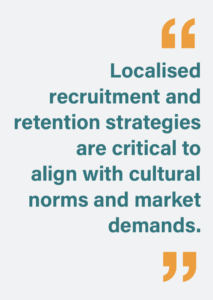
China’s labour market, a cornerstone of its economic success, is changing rapidly in the post-pandemic era. While presenting unique opportunities for businesses, these changes also bring new challenges. In this article, Roland Brouwer of BIPO explains why understanding this evolving landscape is essential for European firms operating in China.
Key challenges in China’s labour market
Talent shortages
Despite its vast population, China is grappling with a mismatch between workforce skills and industry demands. This mismatch stems from a blend of rapid industrial shifts, gaps in education and training systems, and regional and cultural differences. China’s shift from a manufacturing-based economy to a high-tech, services and innovation-driven economy has created new demands for specialised skills. The technology, healthcare and advanced manufacturing sectors are especially impacted by shortages of highly skilled professionals.
For global businesses, attracting and retaining top talent requires strategies, such as:
- offering competitive compensation and benefits;
- prioritising professional development and upskilling programmes; and
- emphasising long-term career growth.
Structural workforce challenges
Various segments of the workforce face unique challenges:
Young workers: Many young graduates encounter limited job opportunities, with unemployment rates in this group significantly exceeding the national average. Skills mismatches and the economic slowdown further exacerbate this issue.
Mid-career professionals: Workers in their 30s and 40s face barriers due to age-related biases and rising employer preferences for younger, lower-cost staff.
Gig and rural workers: These groups face precarious employment conditions, including unstable wages and limited access to training and/or benefits.
Women in the workforce: Societal expectations and employer biases continue to restrict career opportunities for women, especially in leadership roles.
Shifting worker expectations
Post-pandemic, employee priorities have shifted dramatically: younger workers, especially Gen Z employees, value job stability, flexibility and alignment with personal values, such as sustainability and corporate social responsibility. Professionals increasingly prioritise their work-life balance and meaningful engagement in their roles, forcing companies to rethink traditional work models.
Chinese companies are adapting to growing demands for work-life balance by offering flexible work arrangements such as remote and hybrid models. There is an increased focus on employee well-being through enhanced benefits, mental health support and stress management initiatives, while some firms are piloting shorter workweeks to reduce burnout.
Progressive companies are actively moving away from the traditional ‘996’ culture by promoting healthier work-life integration, fostering engagement through career development, corporate social responsibility programmes and employee feedback platforms. Additionally, workspaces are being redesigned with relaxation zones and recreational facilities to improve the workplace experience. These shifts reflect a broader cultural change, positioning businesses to attract and retain talent in a competitive market.
New labour Regulations
China’s labour laws have become more stringent, with a focus on improving workplace conditions. Key developments include:
- enhanced protections for gig workers in response to the rise of the digital economy; and
- stricter enforcement of overtime laws to promote work-life balance.
Businesses must navigate these regulations carefully, ensuring compliance to avoid legal risks while maintaining trust with their workforce.
Emerging opportunities in the labour market
Digital transformation
China’s emphasis on digital transformation is creating significant demand for skilled professionals in areas such as artificial intelligence (AI), big data and advanced manufacturing. Businesses that invest in upskilling and reskilling programmes can not only bridge skill gaps but also position themselves as innovation leaders.
Diverse talent pool
China’s labour market remains one of the most diverse globally, offering opportunities for businesses to foster creativity and innovation through inclusive hiring practices. Tapping into a wide range of skills and perspectives can provide a competitive edge.
Growing service and blue-collar sectors
Demand for blue-collar roles, such as delivery workers and technicians, has surged. Simultaneously, the services industry is expanding rapidly, particularly in travel, retail and wellness. These sectors offer businesses opportunities to grow while addressing changing consumer demands.
Local expertise and partnerships
Collaborating with local human resources (HR) professionals, talent agencies and employer-of-record (EOR) services can simplify compliance, payroll and recruitment. These partnerships allow businesses to focus on strategic growth while ensuring alignment with local labour laws.
Best practices for businesses
1. Tailor HR strategies

Localised recruitment and retention strategies are critical to align with cultural norms and market demands. Businesses should focus on building strong employer branding to attract talent. Companies should align recruitment efforts with local practices, leveraging platforms like 51job and Zhaopin and participating in campus events. Companies should also offer competitive compensation packages that include salaries, housing allowances and social security contributions.
2. Invest in employee well-being
Flexible work arrangements, meaningful engagement and career development opportunities are key to attracting and retaining top talent, particularly younger professionals.
3. Leverage digital talent
Businesses must prioritise hiring and training in digital skills to meet the demands of China’s rapidly modernising industries. As sectors like advanced manufacturing, AI, fintech and e-commerce increasingly rely on technological innovation, the need for a digitally adept workforce has become critical. Companies can leverage this trend by recruiting professionals skilled in areas such as data analytics, cybersecurity, AI engineering and digital marketing, which are in high demand. Companies should also provide staff with upskilling and reskilling programmes to ensure they remain competitive in a fast-evolving technological landscape.
4. Build compliance frameworks
Proactively managing compliance with local labour laws not only helps to prevent legal challenges but also builds trust with employees and stakeholders.
China’s labour rules are getting stricter, so keeping up with laws about wages, social security, work hours and employee protections is crucial to avoid fines, legal issues and business disruptions. But it is not just about avoiding risks – companies that demonstrate they are serious about compliance build trust with employees who want fair treatment and job security. It also helps them earn respect from partners, regulators and customers by demonstrating that they are ethical and responsible. Setting up strong systems, like regular checks, locally tailored HR policies and management training, makes it easier to stay on top of changing rules. Working with legal experts and HR professionals who know China’s labour landscape can also make a big difference.
5. Adapt to market trends
Staying informed about emerging trends and adjusting strategies accordingly ensures businesses remain competitive in a rapidly changing labour market. China’s economy is driven by fast-paced technological change, evolving consumer preferences, new regulations and shifting workforce expectations. By staying in tune with these trends, businesses can better meet local needs, tackle challenges and unlock new opportunities.
Conclusion
China’s labour market is a complex and evolving ecosystem of challenges and opportunities. While workforce shortages, regulatory changes and shifting worker priorities pose obstacles, businesses that embrace innovation, invest in talent and adapt to local dynamics can achieve long-term success.
Global companies, particularly those from Europe, can benefit from leveraging local expertise and focussing on workforce inclusivity and adaptability. By aligning strategies with China’s evolving labour market, businesses can secure a competitive edge in one of the world’s most critical economic hubs.
Roland Brouwer is regional director of corporate and industrial relations for Europe at BIPO. Established in 2010 and headquartered in Singapore, BIPO is a global payroll and people solutions provider. Designed for businesses of any size, from small and medium-sized enterprises to multinational corporations, BIPO’s total HR solutions include Human Capital Management (HCM) solutions, Global Payroll Outsourcing (GPO), and Employer of Record (EOR) services across 150+ global markets.


Recent Comments